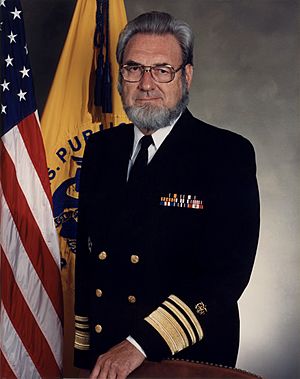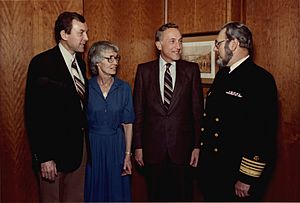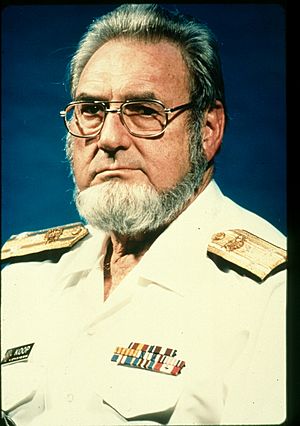C. Everett Koop facts for kids
Quick facts for kids
C. Everett Koop
|
|
|---|---|

Official portrait, 1980s
|
|
| 13th Surgeon General of the United States | |
| In office January 21, 1982 – October 1, 1989 |
|
| President | |
| Preceded by | Julius B. Richmond |
| Succeeded by | Antonia Novello |
| Personal details | |
| Born |
Charles Everett Koop
October 14, 1916 New York City, U.S. |
| Died | February 25, 2013 (aged 96) Hanover, New Hampshire, U.S. |
| Political party | Republican |
| Spouses |
Elizabeth Flanagan
(m. 1938; died 2007)Cora Hogue
(m. 2010) |
| Children | 4 |
| Education | |
| Awards | Calderone Prize (1992) |
Charles Everett Koop (October 14, 1916 – February 25, 2013) was an American doctor who specialized in surgery for children. He also worked as a public health leader. He was a high-ranking officer in the U.S. Public Health Service Commissioned Corps. From 1982 to 1989, he served as the 13th Surgeon General of the United States under President Ronald Reagan.
Many people knew Koop because he often spoke publicly about important health issues. He was especially known for his work on tobacco use and the AIDS crisis in the 1980s. He also strongly supported the rights of children with disabilities.
Contents
Early Life and Education
Koop was born in Brooklyn, New York. He was the only child of John Everett Koop and Helen Koop. In 1937, he earned a degree in zoology from Dartmouth College. His friends there gave him the nickname "Chick."
His interest in medicine began after a serious skiing accident as a child. He spent a year in the hospital recovering. He earned his medical degree (MD) from Cornell Medical College in 1941. He later earned a Doctor of Science degree from the University of Pennsylvania in 1947.
Medical Career
From 1946 to 1981, Koop was the head surgeon at the Children's Hospital of Philadelphia (CHOP). He made many important changes there. In 1956, he started the nation's first special care unit for newborn babies needing surgery. He also helped create a program for a rare liver condition called biliary atresia.
Koop trained many future pediatric surgeons. Many of his students became leaders in children's hospitals across the country. In 1959, he became a professor of pediatric surgery at the University of Pennsylvania School of Medicine.
Groundbreaking Surgeries
While working in Philadelphia, Koop performed amazing surgeries. He successfully separated conjoined twins, which was very difficult at the time. He also developed new ways to do surgery on infants. These techniques are still used today. He saved the lives of many children who might not have survived otherwise.
He was known for operating on babies with serious birth defects. He believed every child deserved a chance to live. He also became the first editor of the Journal of Pediatric Surgery when it started in 1966.
Advocacy for Children
Koop wrote a book called The Right to Live, The Right to Die in 1976. He also helped create a film series in 1978 called Whatever Happened to the Human Race?. These projects focused on the value of human life.
In 1981, President Ronald Reagan chose Koop to be Deputy Assistant Secretary for Health. It was expected that Koop would soon become the Surgeon General.
Surgeon General of the United States

In 1981, Koop was officially nominated to be the Surgeon General. Some people disagreed with his nomination because of his strong conservative views. However, the U.S. Senate approved him on November 16, 1981. He officially started his job on January 21, 1982.
Fighting Tobacco Use
Koop took a strong stand against tobacco use. In 1984, Congress passed a law requiring new health warnings on cigarette packs. These warnings are still used today.
Koop challenged Americans to create a "smoke-free society" by the year 2000. He released eight reports about the dangers of tobacco. These reports included the first one on the health risks of being around tobacco smoke (secondhand smoke). During his time as Surgeon General, smoking rates in the U.S. dropped a lot, from 38% to 27%.
Addressing the AIDS Crisis
Koop was Surgeon General when the AIDS crisis began. For his first four years, he was not allowed to speak much about it publicly. However, he later wrote the official U.S. policy on the disease.
In 1988, he did something never done before: he mailed information about AIDS to every household in the United States. This was a big step to educate the public about the disease.
Supporting Disability Rights
In 1982, a baby known as "Baby Doe" was born with Down syndrome and other health issues. The baby's parents decided not to allow surgery that could have saved his life. Baby Doe's death became a symbol for newborns with disabilities.
Koop had a special interest in this case because of his background as a pediatric surgeon. He had successfully operated on many babies with similar conditions. He became a strong supporter of policies to protect the rights of newborns with disabilities. This led to Congress passing the Baby Doe Amendment, which helped ensure medical care for infants with disabilities.
Public Profile
Koop's work on tobacco, AIDS, and disability rights made the Surgeon General's office much more visible. He became well-known for his distinctive beard and colorful bow ties. He also brought back the tradition of officers in the Public Health Service wearing their uniforms daily.
Later Career
After leaving his role as Surgeon General, Koop continued to be active in public health. In 1991, he hosted a documentary series called C. Everett Koop, M.D. on NBC.
In 1997, Koop helped start drkoop.com, one of the first major websites to provide health information online. The company later closed, but Koop continued to support health initiatives. He also held three professorships at Dartmouth Medical School.
Personal Life
In 1968, Koop's son David died in a rock climbing accident. Koop later wrote that this experience made it harder, but also sometimes easier, for him to help parents who had lost a child. He and his wife wrote a book called Sometimes Mountains Move to help others dealing with similar grief.
His first wife, Elizabeth Koop, died in 2007 after nearly 70 years of marriage. In 2010, he married Cora Hogue.
Death and Legacy
C. Everett Koop died on February 25, 2013, at the age of 96, at his home in Hanover, New Hampshire. He had been ill for several months.
Many people praised Koop's impact on public health. The president of the American Medical Association said Koop had a "dramatic impact" on public health. The Philadelphia Inquirer called him a "courageous and brilliant pediatric surgeon." He is remembered for his dedication to improving the health of Americans, especially children.
Awards and Honors
- Public Health Service Distinguished Service Medal
- Public Health Service Meritorious Service Medal
- Surgeon General's Medallion
- Surgeon General's Exemplary Service Medal
- Public Health Service Citation Medal
- Public Health Service Outstanding Unit Citation
- Presidential Medal of Freedom (1995)
- Public Health Service Foreign Duty Service Award
- Public Health Service Regular Corps Ribbon
- Légion d'Honneur (1980)
- Order of Merit of Duarte, Sánchez and Mella, the highest award of the Dominican Republic
- Association of Military Surgeons of the United States with gold star
- Denis Brown Gold Medal by the British Association of Paediatric Surgeons
- William E. Ladd Gold Medal of the American Academy of Pediatrics
- Fellow of the American College of Surgeons (FACS)
- Royal College of Surgeons of England (1982)
- Royal College of Physicians and Surgeons of Glasgow (1987)
- Royal Society of Medicine (1997)
- Honorary Fellowship of the Royal College of Surgeons of Edinburgh (HonFRCS) (2009)
- U.S. Senator John Heinz Award for Greatest Public Service by an Elected or Appointed Official (1988 Jefferson Award)
- Public Welfare Medal from the National Academy of Sciences (1990)
- Albert Schweitzer Prize for Humanitarianism (1991)
- Tyler Prize for Environmental Achievement (1991)
- Emmy Award in the News and Documentary category for "C. Everett Koop, MD," a five-part series on health care reform (1991)
- The 2nd Annual Heinz Award in Public Policy (1996)
- Member of the American Academy of Arts and Sciences (1990)
- Member of the American Philosophical Society (1992)
See also
 In Spanish: C. Everett Koop para niños
In Spanish: C. Everett Koop para niños
 | James Van Der Zee |
 | Alma Thomas |
 | Ellis Wilson |
 | Margaret Taylor-Burroughs |


